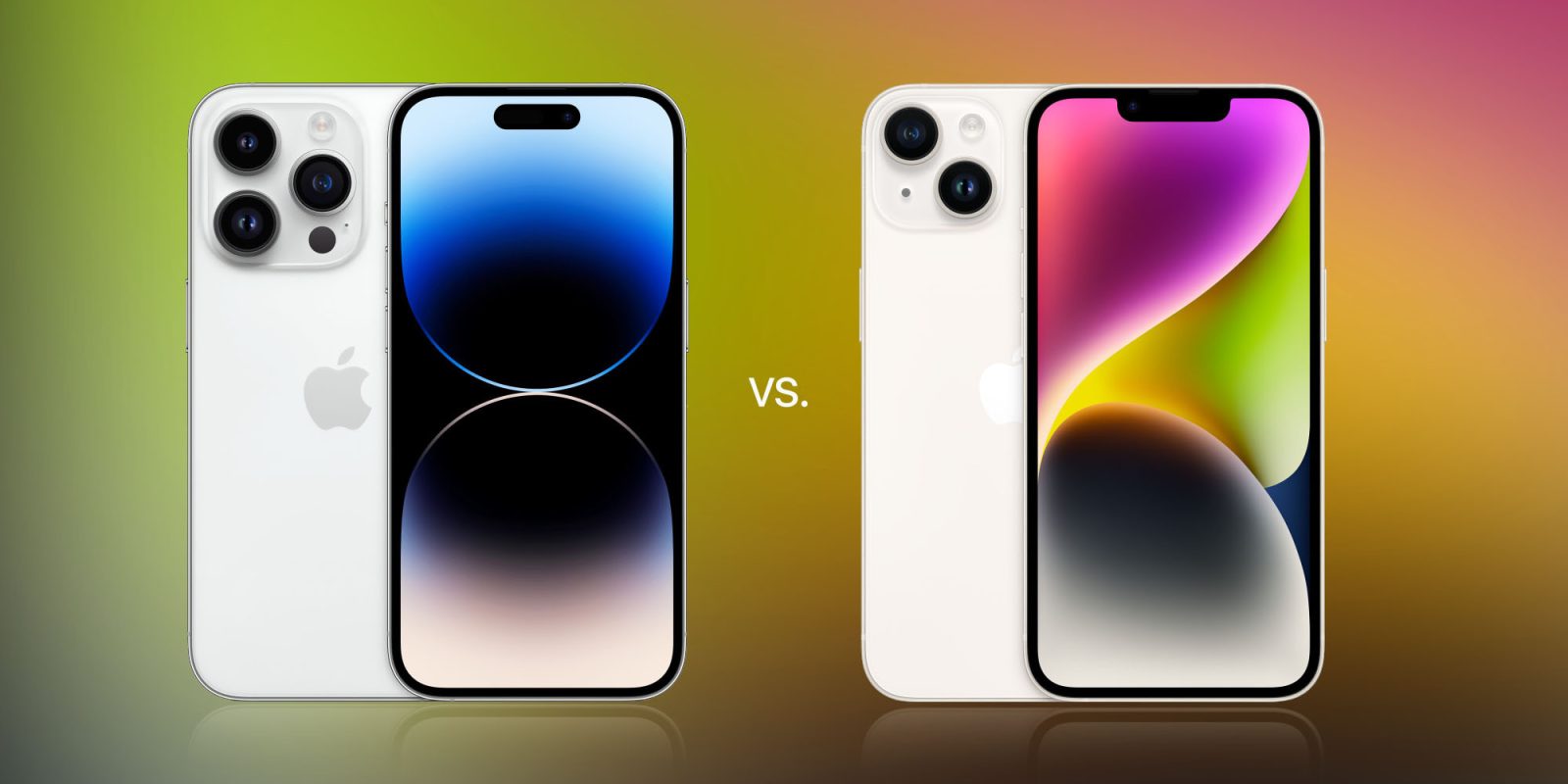
The iPhone 14 and iPhone 14 Pro represent Apple’s latest and greatest devices. The decision between choosing an iPhone 14 model, however, can be tricky. The iPhone 14 Pro is obviously more powerful and capable, but you also have to factor in differences like pricing, battery life, and overall weight. Head below for a deep dive into the iPhone 14 vs iPhone 14 Pro.
Table of contents
iPhone 14 vs iPhone 14 Pro: Screen sizes
For the first year ever, both the standard iPhone 14 and the iPhone 14 Pro are available in the same screen sizes. Regardless of which family you pick, you have your choice between a 6.1-inch or 6.7-inch screen. This is a major difference compared to the past two years, when the top-tier “Pro Max” was the only choice for those who wanted the largest 6.7-inch screen.
But with that in mind, there are some big differences in terms of the screen technology and features. Namely, the iPhone 14 Pro and iPhone 14 Pro Max offer ProMotion display technology for smoother animations, the new Digital Island that replaces the notch, and the first-ever Always-On display.
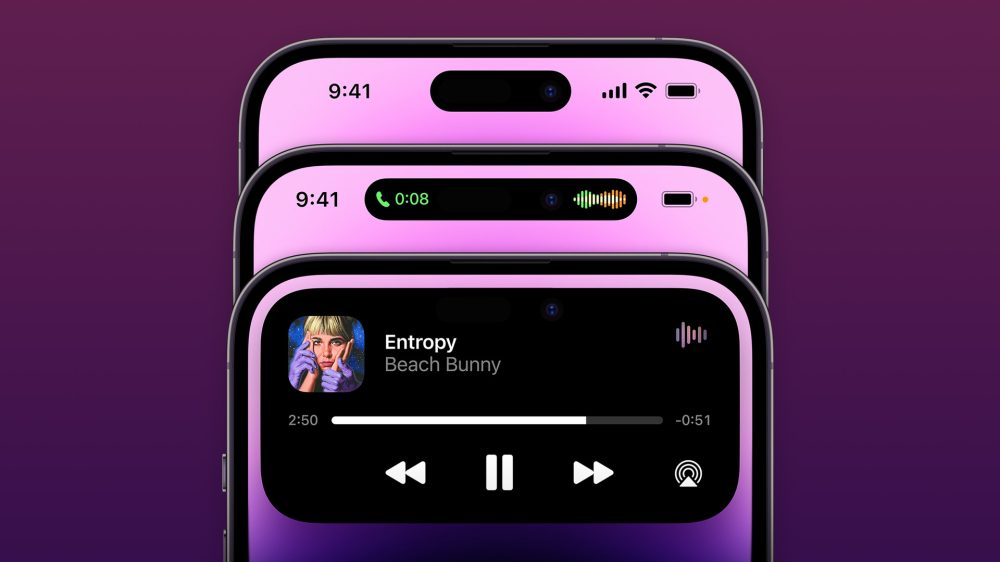
The iPhone 14 Pro’s Always-On display enables the screen to show you your lock screen widgets, the time, and your wallpaper at all times. This is the first time Apple has ever implemented an Always-On display for the iPhone.
Meanwhile, the Digital Island brings a new level of interactivity in replacement of the notch. You can tap and hold to find more options and controls. The Dynamic Island can show things like album art for content in the Music app, controls for FaceTime, specific background activities, and more. The new Live Activities feature coming iOS 16 also integrates with the Dynamic Island, meaning you can see live notifications directly in the new screen area.
While those are the bigger differences between the displays, there are some other technical details as well. Here’s the full breakdown of the display technology inside the iPhone 14 vs iPhone 14 Pro.
| iPhone 14 | iPhone 14 Plus | iPhone 14 Pro | iPhone 14 Pro Max | |
| Size | 6.1-inches | 6.7-inches | 6.1-inches | 6.7-inches |
| Resolution | 2532×1170-pixels | 2778‑by‑1284-pixels | 2556‑by‑1179-pixels | 2796‑by‑1290-pixel |
| PPI | 460ppi | 458ppi | 460ppi | 460ppi |
| ProMotion? | ❌ | ❌ | ✅ | ✅ |
| Dynamic Island? | ❌ | ❌ | ✅ | ✅ |
| Always-on display? | ❌ | ❌ | ✅ | ✅ |
| Typical brightness | 800 nits max | 800 nits max | 1000 nits max | 1000 nits max |
| Outdoor brightness | 800 nits max | 800 nits max | 2000 nits max | 2000 nits max |
| HDR brightness | 1200 nits max | 1200 nits max | 1600 nits max | 1600 nits max |
| True Tone | ✅ | ✅ | ✅ | ✅ |
| Haptic Touch | ✅ | ✅ | ✅ | ✅ |
Size and design
There are some notable differences in the design and dimensions of the iPhone 14 and iPhone 14 Pro lineups, even though they share screen sizes. There are also differences between the materials used for each model, the weight, and more.
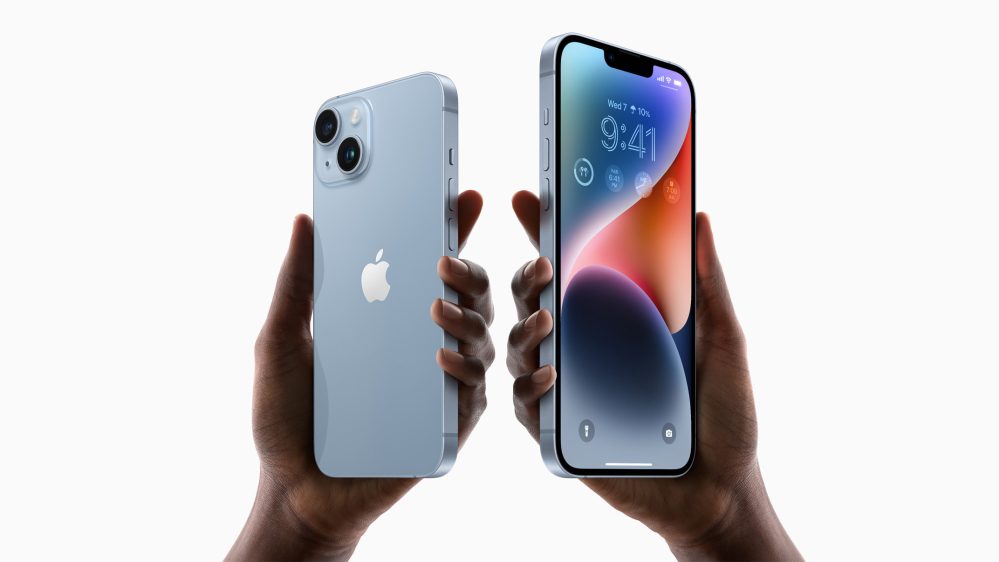
As you can see in the chart below, the rough dimensions of the respective iPhone 14 and iPhone 14 Pro models are the same. The biggest difference is the weight, with the iPhone 14 Pro and iPhone 14 Pro Max weighing noticeably more than the non-Pro counterparts. This is due to the heavier stainless steel edges, the larger camera modules (more on that in a bit), and the larger batteries.
Here’s a rundown of what you need to know.
| iPhone 14 | iPhone 14 Plus | iPhone 14 Pro | iPhone 14 Pro Max | |
| Height | 5.78-inches (146mm) | 6.33-inches (160.8mm) |
5.81-inches (147.5mm) | 6.33-inches (160.7mm) |
| Width | 2.82-inches (71.5mm) |
3.07-inches (78.1mm) | 2.81-inches (71.5mm) | 3.05-inches (77.6mm) |
| Thickness | 0.31-inches (7.80mm) | 0.31-inches (7.80mm) |
0.31-inches (7.85mm) |
0.31-inches (7.85mm) |
| Weight | 6.07-ounces (172 grams) |
7.16-ounces (203 grams) |
7.27-ounces (206 grams) |
8.47-ounces (240 grams) |
| Durability | IP68 (splash, dust, 6 meters of water up to 30 minutes | IP68 (splash, dust, 6 meters of water up to 30 minutes | IP68 (splash, dust, 6 meters of water up to 30 minutes | IP68 (splash, dust, 6 meters of water up to 30 minutes |
| Back material | Glossy glass | Glossy glass | Matte glass | Matte glass |
| Edges | Aluminum | Aluminum | Stainless steel | Stainless steel |
iPhone 14 Pro Max cases:
iPhone 14 Pro cases:
iPhone 14 cases:
- Spigen Ultra Hybrid Clear Case
- TORRAS Magnetic Case for iPhone 14
- Caseology Silicone Case
- Spigen Thin Fit
iPhone 14 Plus cases:
Performance
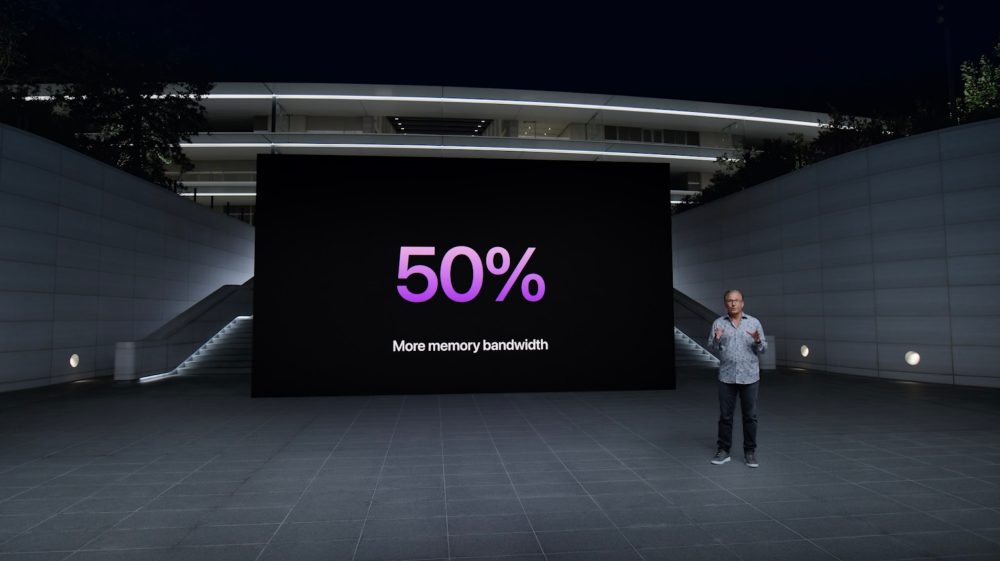
For the first year ever, Apple has split the performance between the iPhone 14 and iPhone 14 Pro. The iPhone 14 models are powered by an upgraded version of the A15 chip used last year (just with an added GPU core). The iPhone 14 Pro models use Apple’s newest A16 Bionic chip, which is Apple’s first 4nm processor.
We’re still waiting on the exact details on iPhone 14 vs iPhone 14 Pro performance. The fact of the matter is, however, that iPhone performance is already overkill for the majority of buyers nowadays.
Here’s a breakdown of the full iPhone 14 vs iPhone 14 specifications:
| iPhone 14 | iPhone 14 Plus | iPhone 14 Pro | iPhone 14 Pro Max | |
| Processor | A15 Bionic | A15 Bionic | A16 Bionic | A16 Bionic |
| CPU | 6-core: 2 performance + 4 efficiency | 6-core: 2 performance + 4 efficiency | 6-core: 2 performance + 4 efficiency | 6-core: 2 performance + 4 efficiency |
| GPU | 5-core | 5-core | 5-core | 5-core |
| Neural Engine | 16-core | 16-core | 16-core | 16-core |
| RAM | 6GB | 6GB | 6GB | 6GB |
| Back material | Glossy glass | Glossy glass | Matte glass | Matte glass |
| Edges | Aluminum | Aluminum | Stainless steel | Stainless steel |
Battery life
Battery life is a big factor when deciding which iPhone 14 to order. The battery stats from Apple can be a bit vague, but here’s what we know.
| iPhone 14 | iPhone 14 Plus | iPhone 14 Pro | iPhone 14 Pro Max | |
| Video playback | 20 hours | 26 hours | 23 hours | 29 hours |
| Audio playback | 80 hours | 100 hours | 75 hours | 95 hours |
Camera
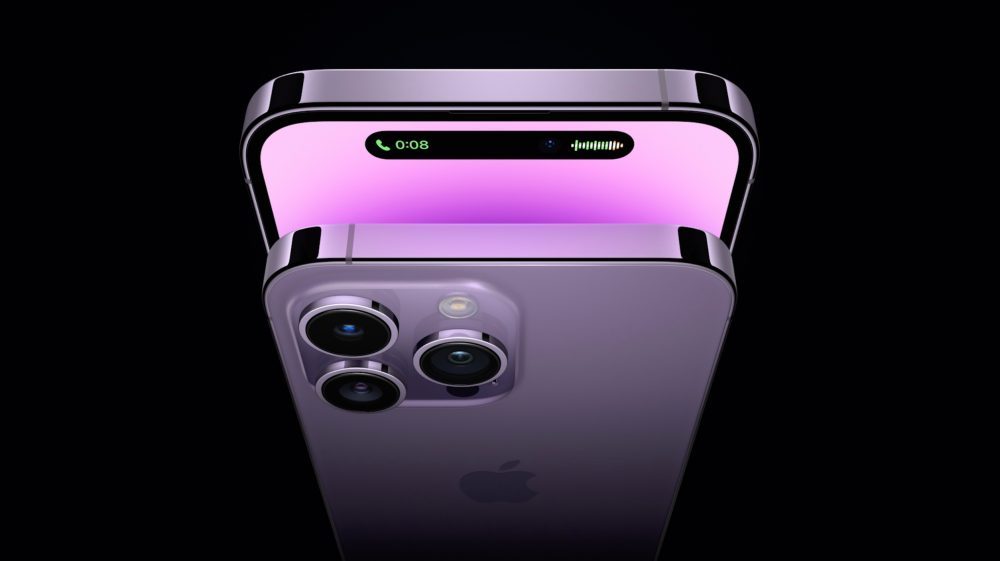
One of the biggest ways the iPhone 14 and iPhone 14 Pro differ is in terms of camera technology. The gap between iPhone 14 and iPhone 14 Pro is even bigger this year than before. Because of the new 48MP camera on the iPhone 14 Pro, the main camera uses quad-pixel technology to adapt to the photo being captured.
Both the iPhone 14 and iPhone 14 Pro also feature a new Photonic Engine. Apple describes this as a new computational photography feature that offers a “giant leap for mid- to low-light performance in photos across all cameras through a deep integration of hardware and software.”
On the iPhone 14, Apple says you can expect improved mid- to low-light performance of up to 2x on the Ultra Wide camera, 2x on the TrueDepth camera, and 2.5x on the Main camera.
On the iPhone 14 Pro, the benefit is even better: up to 2x on the Main camera, up to 3x on the Ultra Wide camera, up to 2x on the Telephoto camera, and up to 2x on the TrueDepth camera.
Here are some more technical details on the iPhone 14 vs iPhone 14 Pro camera systems:
| iPhone 14/Plus | iPhone 14 Pro/Max | |
| Main camera | 12MP, ƒ/1.5 aperture, 26 mm 2x optical zoom, 5x digital zoom |
48MP, ƒ/1.78, aperture, 24 mm |
| Sensor-shift optical image stabilization |
✅ | ✅ |
| Ultra Wide | 12MP, ƒ/2.4 aperture, 13mm | 12MP, ƒ/2.2 aperture, 13mm |
| Telephoto lens | ❌ | ✅: 48 mm, ƒ/1.78 aperture |
| Zoom | 2x optical zoom, 5x digital zoom | 3x optical zoom in, 2x optical zoom out digital zoom up to 15x |
| Apple ProRAW | ✅ | ✅ |
| Smart HDR 4 | ✅ | ✅ |
| Photonic Engine | ✅ | ✅ |
| Photographic Styles | ✅ | ✅ |
| Panoramas | ✅, 63MP | ✅, 63MP |
| Portrait mode | ✅ | ✅ |
Video recording?
iPhone 14 and iPhone 14 Plus camera technology:
- 4K video recording at 24 fps, 25 fps, 30 fps, or 60 fps
- 1080p HD video recording at 25 fps, 30 fps, or 60 fps
- 720p HD video recording at 30 fps
- Cinematic mode up to 4K HDR at 30 fps
- Action mode up to 2.8K at 60 fps
- HDR video recording with Dolby Vision up to 4K at 60 fps
- Slo‑mo video support for 1080p at 120 fps or 240 fps
- Time‑lapse video with stabilization
- Night-mode Time-lapse
- QuickTake video
- Sensor-shift optical image stabilization for video (Main)
- 2x optical zoom out
- Digital zoom up to 3x
- Audio zoom
- True Tone flash
- Cinematic video stabilization (4K, 1080p, and 720p)
- Continuous autofocus video
- Take 8MP still photos while recording 4K video
- Playback zoom
- Video formats recorded: HEVC and H.264
- Stereo recording
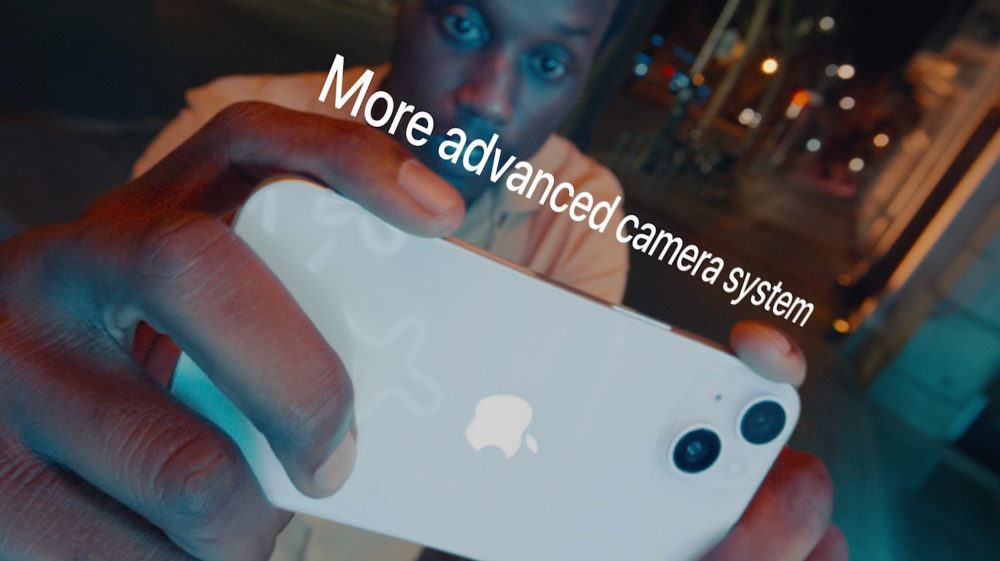
iPhone 14 Pro and iPhone 14 Pro Max camera technology:
- 4K video recording at 24 fps, 25 fps, 30 fps, or 60 fps
- 1080p HD video recording at 25 fps, 30 fps, or 60 fps
- 720p HD video recording at 30 fps
- Cinematic mode up to 4K HDR at 30 fps
- Action mode up to 2.8K at 60 fps
- HDR video recording with Dolby Vision up to 4K at 60 fps
- ProRes video recording up to 4K at 30 fps (1080p at 30 fps for 128GB storage)
- Macro video recording, including slo-mo and time-lapse
- Slo‑mo video support for 1080p at 120 fps or 240 fps
- Time‑lapse video with stabilization
- Night-mode Time-lapse
- QuickTake video
- Second‑generation sensor‑shift optical image stabilization for video (Main)
- Dual optical image stabilization for video (Main and Telephoto)
- 3x optical zoom in, 2x optical zoom out; 6x optical zoom range
- Digital zoom up to 9x
- Audio zoom
- True Tone flash
- Cinematic video stabilization (4K, 1080p, and 720p)
- Continuous autofocus video
- Take 8MP still photos while recording 4K video
- Playback zoom
- Video formats recorded: HEVC, H.264, and ProRes
- Stereo recording
Selfie camera
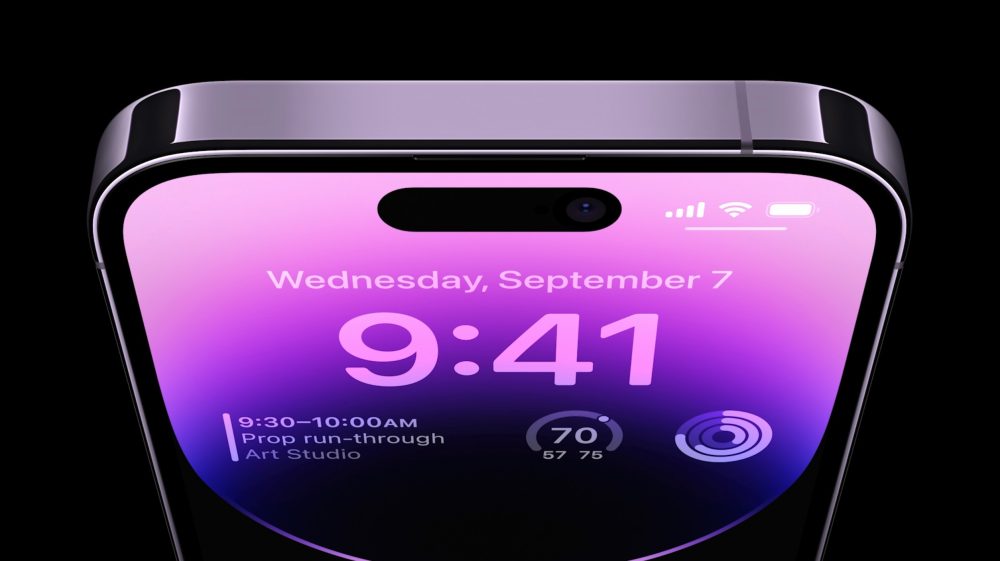
Both the iPhone 14 and iPhone 14 Pro lineups offer one of the biggest jumps in front-camera performance we’ve ever seen. Both use a new camera with an ƒ/1.9 aperture that enables better low-light performance for photos and video. It also offers auto-focus for the first time, so it can focus in low light and capture group selfies from farther away.
Full spec sheet for the selfie cameras on the iPhone 14 and iPhone 14 Pro:
- 12MP camera
- ƒ/1.9 aperture
- Autofocus with Focus Pixels
- Six‑element lens
- Retina Flash
- Photonic Engine
- Deep Fusion
- Smart HDR 4
- Portrait mode with advanced bokeh and Depth Control
- Portrait Lighting with six effects (Natural, Studio, Contour, Stage, Stage Mono, High‑Key Mono)
- Animoji and Memoji
- Night mode
- Photographic Styles
- Apple ProRAW
- Wide color capture for photos and Live Photos
- Lens correction
- Auto image stabilization
- Burst mode
- 4K video recording at 24 fps, 25 fps, 30 fps, or 60 fps
- 1080p HD video recording at 25 fps, 30 fps, or 60 fps
- Cinematic mode up to 4K HDR at 30 fps
- HDR video recording with Dolby Vision up to 4K at 60 fps
- ProRes video recording up to 4K at 30 fps (1080p at 30 fps for 128GB storage)
- Slo‑mo video support for 1080p at 120 fps
- Time‑lapse video with stabilization
- Night-mode Time-lapse
- QuickTake video
- Cinematic video stabilization (4K, 1080p, and 720p)
Bolded bullets = iPhone 14 Pro/Pro Max only
Colors
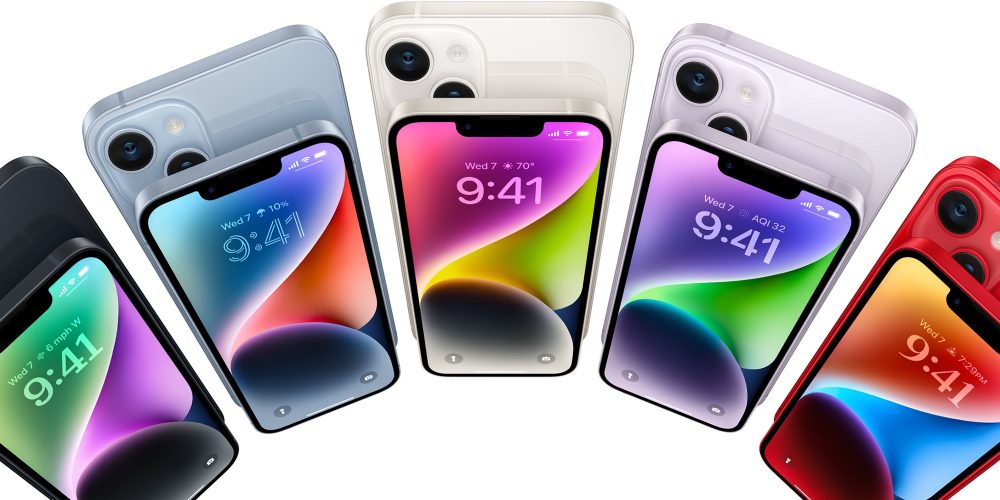
The iPhone 14 and iPhone 14 Plus are available in five different colors:
- Midnight
- Purple
- Starlight
- (Product)RED
- Blue
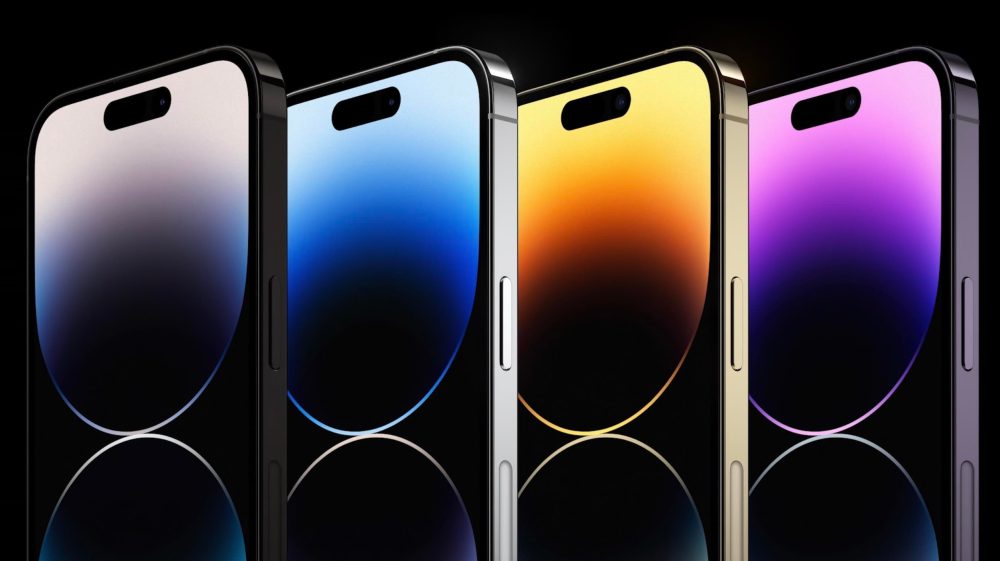
The iPhone 14 Pro and iPhone 14 Pro Max are available in four different colors:
- Silver (Updated)
- Deep Purple
- Space Black
- Gold
Storage
iPhone 14 and iPhone 14 Plus:
- 128GB
- 256GB
- 512GB
iPhone 14 Pro and iPhone 14 Pro Max:
- 128GB
- 256GB
- 512GB
- 1TB
Pricing
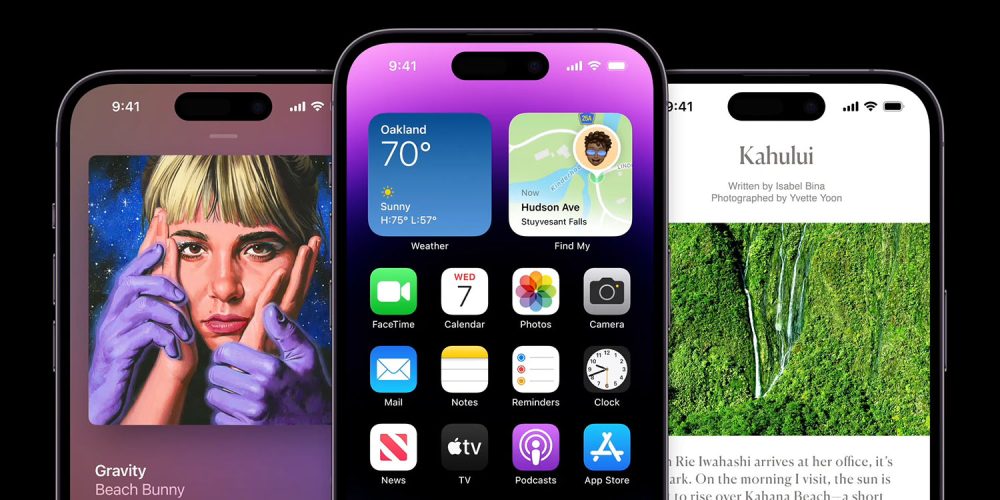
iPhone 14:
- $799 – 128GB
- $899 – 256GB
- $999 – 512GB
iPhone 14 Plus:
- $899 – 128GB
- $999 – 256GB
- $1099 – 512GB
iPhone 14 Pro:
- $999 – 128GB
- $1099 – 256GB
- $1299 – 512GB
- $1499 – 1TB
iPhone 14 Pro Max:
- $1099 – 128GB
- $1199 – 256GB
- $1399 – 512GB
- $1599 – 1TB
Other features
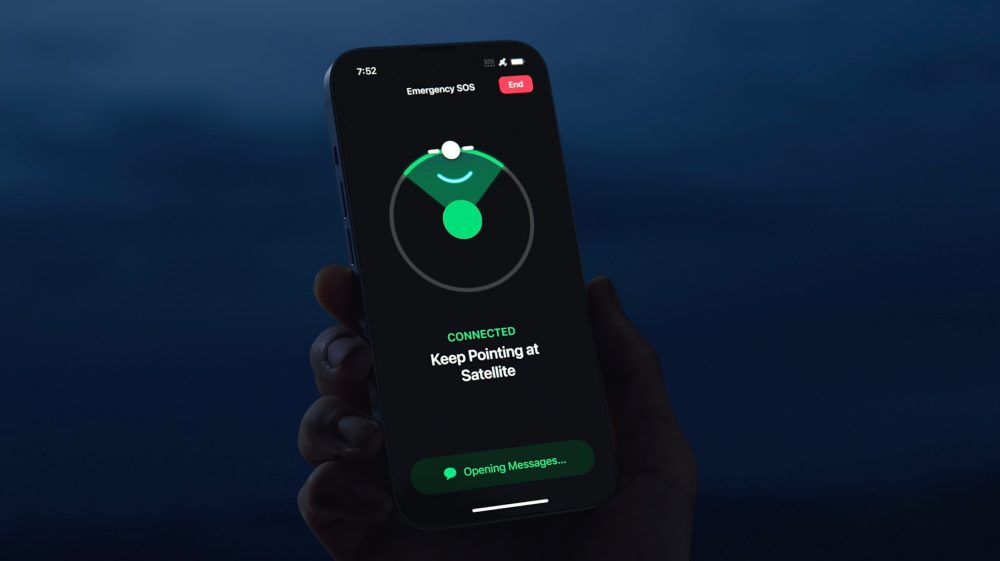
And here are some other features that are offered by both the iPhone 14 and iPhone 14 Pro:
- Crash detection that can recognize when you’re in a car accident and call emergency services.
- Satellite connectivity for reaching emergency services when you aren’t connected to a cellular or WiFi network.
- Action mode for stabilizing video during fast-moving scenarios like running or other sports.
- Ceramic Shield front for improved display durability
Included accessories
Citing environmental concerns, Apple is not including headphones or a charging brick in the iPhone 14 box this year. Here are some accessories you might consider picking up to help fill that gap and complement your new iPhone.
- Native Union Drop 10W Qi Charger
- Anker 30W USB-C wall charger
- USB-C to Lightning cable
- Lightning to 3.5mm headphone adapter or cable
iPhone 14 vs iPhone 14 Pro: Which should you buy in 2023?
The iPhone 14 and iPhone 14 Pro lineups are similar in many ways. This is especially true because of the screen size options. As I said at the start, you no longer have to spring for the most expensive iPhone in order to get the largest display. For many people, the screen size is one of the deciding factors in picking an iPhone.
The biggest differences between the iPhone 14 and iPhone 14 Pro are the new display features, including Digital Island and Always-On, and the camera upgrades. The Digital Island and Always-On display both provide an additional layer of functionality compared to previous generations of iPhones. The advancements, however, aren’t ones that significantly change the day-to-day use of the iPhone.
The camera upgrades offered by the iPhone 14 Pro vs the iPhone 14 are the biggest things to consider. If you’re someone who is constantly taking videos and pictures with your iPhone, these changes are going to bring a significant improvement to the end result. The combination of the new computational photography features and the 48MP sensor is huge. This is the first time in years that Apple has increased the megapixel count of the iPhone’s main camera.
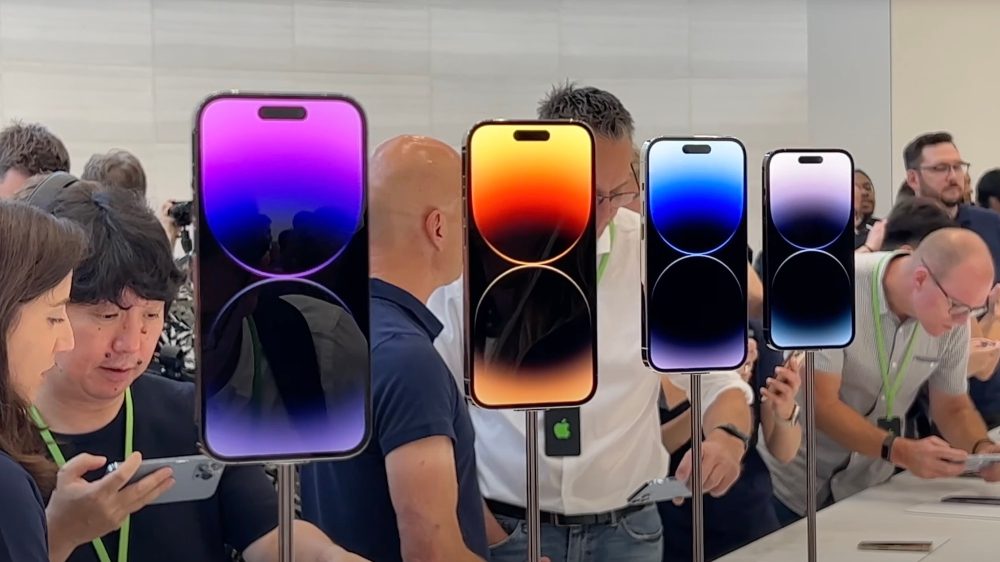
My personal suggestion is to look at how you use your iPhone and look at the price differences between the iPhone 14 and iPhone 14 Pro. Do you take enough pictures and videos to really benefit from the new camera features? Are you consistently taking pictures and videos of something in your life that’s really important? If so, the iPhone 14 Pro is the way to go.
But if not, the iPhone 14 and iPhone 14 Plus are still incredible phones. The camera hardware is as impressive as in years past, and you benefit from some of the additional computational photography technology. The iPhone 14 and iPhone 14 Plus are also notably cheaper than the iPhone 14 Pro models.
What do you think about the iPhone 14 vs iPhone 14 Pro debate? Let us know down in the comments!
Last updated February 13, 2023
Add 9to5Mac to your Google News feed.
FTC: We use income earning auto affiliate links. More.






